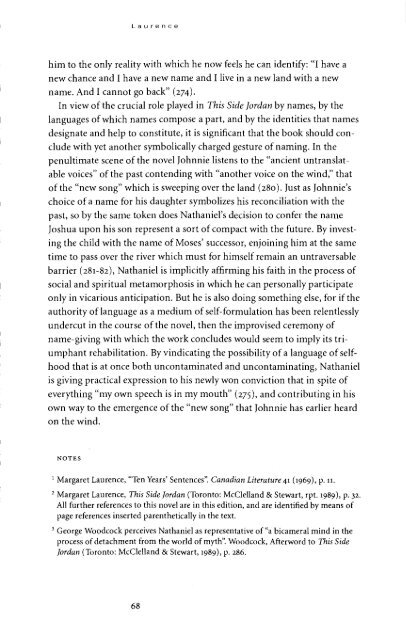The Carpathians - University of British Columbia
The Carpathians - University of British Columbia
The Carpathians - University of British Columbia
You also want an ePaper? Increase the reach of your titles
YUMPU automatically turns print PDFs into web optimized ePapers that Google loves.
him to the only reality with which he now feels he can identify: "I have a<br />
new chance and I have a new name and I live in a new land with a new<br />
name. And I cannot go back" (274).<br />
In view <strong>of</strong> the crucial role played in This Side Jordan by names, by the<br />
languages <strong>of</strong> which names compose a part, and by the identities that names<br />
designate and help to constitute, it is significant that the book should conclude<br />
with yet another symbolically charged gesture <strong>of</strong> naming. In the<br />
penultimate scene <strong>of</strong> the novel Johnnie listens to the "ancient untranslatable<br />
voices" <strong>of</strong> the past contending with "another voice on the wind," that<br />
<strong>of</strong> the "new song" which is sweeping over the land (280). Just as Johnnie's<br />
choice <strong>of</strong> a name for his daughter symbolizes his reconciliation with the<br />
past, so by the same token does Nathaniel's decision to confer the name<br />
Joshua upon his son represent a sort <strong>of</strong> compact with the future. By investing<br />
the child with the name <strong>of</strong> Moses' successor, enjoining him at the same<br />
time to pass over the river which must for himself remain an untraversable<br />
barrier (281-82), Nathaniel is implicitly affirming his faith in the process <strong>of</strong><br />
social and spiritual metamorphosis in which he can personally participate<br />
only in vicarious anticipation. But he is also doing something else, for if the<br />
authority <strong>of</strong> language as a medium <strong>of</strong> self-formulation has been relentlessly<br />
undercut in the course <strong>of</strong> the novel, then the improvised ceremony <strong>of</strong><br />
name-giving with which the work concludes would seem to imply its triumphant<br />
rehabilitation. By vindicating the possibility <strong>of</strong> a language <strong>of</strong> selfhood<br />
that is at once both uncontaminated and uncontaminating, Nathaniel<br />
is giving practical expression to his newly won conviction that in spite <strong>of</strong><br />
everything "my own speech is in my mouth" (275), and contributing in his<br />
own way to the emergence <strong>of</strong> the "new song" that Johnnie has earlier heard<br />
on the wind.<br />
NOTES<br />
1 Margaret Laurence, "Ten Years' Sentences". Canadian Literature 41 (1969), p. 11.<br />
2 Margaret Laurence, This Side Jordan (Toronto: McClelland & Stewart, rpt. 1989), p. 32.<br />
All further references to this novel are in this edition, and are identified by means <strong>of</strong><br />
page references inserted parenthetically in the text.<br />
3 George Woodcock perceives Nathaniel as representative <strong>of</strong> "a bicameral mind in the<br />
process <strong>of</strong> detachment from the world <strong>of</strong> myth". Woodcock, Afterword to This Side<br />
Jordan (Toronto: McClelland & Stewart, 1989), p. 286.

















